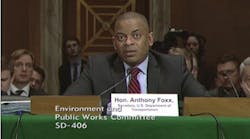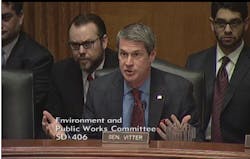Senate kicks off highway bill debate; ‘to hell with politics,’ DOT Sec. Foxx says
When it comes to the transportation system, the U.S. is losing the race both against the nation’s own history of innovation and now against global economic competitors, Transportation Sec. Anthony Foxx told a Senate committee on Wednesday.
Backed by a panel of governors, he noted that, in just the past six years, 32 short-term extensions to the federal plan that pays for highways have created such funding uncertainty in state transportation departments that it’s “killing their will to build.”
Indeed, the “cumulative effects of policy uncertainty” has already resulted in project cancellations in several states.
“The transportation system itself does not care about the political challenges of addressing its needs,” Foxx said, testifying before the Environment and Public Works committee. “We must do something dramatic. To hell with the politics.”
In laying out the Obama administration’s plan, Foxx called for “substantially” greater investment in terms of dollars and in the timeframe of the spending program. He also proposed policy changes that will streamline the design and approval process while still protecting the environment, and pushed for “opening the door” to more private investment.
And Foxx told the committee to expect a “new and improved” GROW AMERICA Act – the administration’s infrastructure blueprint – later this year.
EPW hopeful
The EPW committee was broadly supportive, and its leadership somewhat self-congratulatory on its bipartisan willingness to take on the infrastructure issue.
“I say to my friends on the left and right, the significance of this meeting is that we want to get it right it this time,” committee chairman James Inhofe, an Oklahoma Republican, said. “We’ve done patchwork, and we’ve put together things we thought were good ideas. But I didn’t like the way things went in the 27-month bill we had [MAP-21], I didn’t like the idea that a lot of Republicans were demagoguing it and thinking they were doing the conservative thing, but it’s not: The conservative thing is to pass a bill instead of having these extensions.”
Inhofe estimated that the cost of short-term extensions is 30% “off the top.”
Ranking Democrat Barbara Boxer, of California, noted that she and some conservative members “don’t see eye to eye on much,” but that the committee – as the rest of Congress struggles with “partisan paralysis” – has been uniquely bipartisan and productive when it comes to developing transportation funding legislation.
“We’re going to be working together to get this done,” Boxer said, and she emphasized the importance of a multi-year highway bill to the middle class, and the risk of letting the Highway Trust Fund go broke. “The vast majority of our colleagues have punted this. This is the greatest country in the world, but it won’t remain so if our bridges are falling down and our highways are crumbling.”
And though the committee is charged with developing transportation policy, not funding the wish list, several members did offer their ideas on paying for the next highway bill.
Sen. Tom Carper, a Delaware Democrat, called for an “all of the above” funding approach, including public-private partnerships, an infrastructure bank, and repatriation of corporate profits sheltered overseas.
But, as do many business and transportation groups including American Trucking Associations, Carper emphasized the importance of paying for transportation projects with user fees. He anticipates legislation will be introduced in both the Senate and the House next month which would raise the tax on gasoline and diesel “three or four cents” each year for the next four years and index it to inflation.
The conservative group Americans for Prosperity, however, said Wednesday that it would advocate against raising the federal gas tax, and led a broad coalition of 50 organizations in releasing a letter that urges Congress to reject it.
The coalition said Americans deserve to enjoy the break they’re getting on gas prices, and that the Highway Trust Fund has “a spending problem, not a revenue problem.”
“Over one-third of HTF spending today is for non-highway purposes,” including “completely unrelated projects like museums and squirrel sanctuaries,” AFP said in the letter.
Other proposals
EPW isn’t alone in taking on the federal transportation plan.
Earlier this week, Senate Budget Committee ranking member Bernie Sanders introduced a bill that would invest $1 trillion in infrastructure over five years, with a large portion going to highways – including an extra $75 billion per year to the Highway Trust Fund. Funding, however, remains the challenge.
And on the House side, Rep. John Delaney (D.-MD), has introduced the Infrastructure 2.0 Act, legislation that uses international corporate tax reform to patch the Highway Trust Fund hole for six years, creates a new financing tool and establishes “a path for broader pro-growth tax reform” and improved infrastructure financing.
Similarly, Boxer and Sen. Rand Paul (R-KY) announced Thursday that they will be introducing the Invest in Transportation Act of 2015, bipartisan legislation that would extend the Highway Trust Fund, which supports millions of jobs.
The bill would also boost economic growth and create jobs by providing an incentive for companies to bring back some of the estimated $2 trillion in foreign earnings that are being held overseas.
A white paper explains the details of their proposal, which the senators expect to introduce in the coming weeks.




